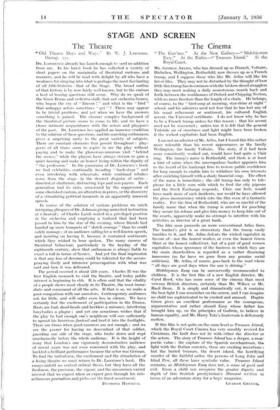STAGE AND SCREEN The Theatre
DR. LAWRENCE already has laurels enough to -.wed no addition from me. In his latest book he has collected a variety of .short papers on the marginalia of theatrical customs and manners, and he will be read with delight by all who have a weakness for straying into what is perhaps the most fascinating of all HUM-histories—that of the Stage. The broad outline of that history is by now fairly well known, but to the curious a host of teasing questions still occur. Why do we speak of the Green Room and orchestra-stalls (but not orchestra-boxes), who began the cry of Encore ! " and what is the " bird " that unhappy actors sometimes " get " ? These may appear to be trivial problems, and yet when we have the answers Eornething is gained. The obscure complex background of the theatrical picture seems to come to life; and we have a closer intimate acquaintance with the actors and playgoers of the past. Dr. Lawrence has applied an immense erudition to the solution of these questions, and his searching enthusiasm gives a surprising unity to the great variety of subjects. There are constant elements that persist throughout : play- goers of all times seem to aspire to see the play without paying and to make the glamorous-amorous visit "behind the scenes," while the players have always striven to gain a quiet hearing and make an honest living within the dignity of " the profession." In the panorama of Dr. Lawrence's book we find celebrities continually invading " back-stage " and even interfering with rehearsals, while continual rebukes conic from the stage—in the discreet disguise of satire— directed at chatterers, distracting fops and non-payers. Each generation had its riots, occasioned by the suppression of some cherished custom, an alteration in prices, or the discovery of a stimulating political innuendo in an apparently innocent speech.
In course of the solution of various problems we catch intriguing glimpses of Dr. Johnson giving uninvited instruction at rthearsal ; of Charles Lamb seated in a privileged position in the orchestra and emptying a tankard that had been passed to him by the star of the evening, whose friends had handed up more bouquets of" dutch courage" than he could safely manage ; of an audience calling for a well-known speech, and insisting on having it, because it contained sentiments which they wished to hear spoken. The many cameos of theatrical behaviour, particularly in the heyday of the eighteenth century, show that enthusiasm is always liable to exact a toll in terms of licence. And yet the final impression is that any loss of decorum could be tolerated for the accom- panying lively and intensive preoccupation with what was said and how it was delivered.
The period covered is about 250 years. Charles II was the first English monarch to visit the theatre, and today public interest is beginning to ebb. It is often said that the vitality of a people shows most clearly in its Theatre, the most imme- diate and communal of all the arts. If that is so, we make a poor comparison with our ancestors. Contemporary audiences ask for little, and will suffer even less in silence. We have certainly lost the excitement of participation in the Drama. Riots are bad, dead-heads and hecklers a nuisance, interfering busybodies a plague ; and yet one sometimes wishes that if the play be bad enough one's neighbour will care sufficiently to uproot his luxurious fauteuil and hurl it into the footlights. There are times when good manners are not enough ; and we are the poorer for having no descendant of that soldier, guarding one side of the stage, who broke down and wept unashamedly before the whole audience. It is the height of irony that London's one vigorously demonstrative audience of recent years was not even concerned with the play, and heckled a brilliant performance because the actor was German. To find the turbulence, the excitement and the stimulation of a living theatre we must return to Dr. Lawrence's book. His essays unfold no central critical thesis, but they have all the freshness, the precision, the vigour, and the uncommon varied' interest that we expect when an expert goes through his mis- cellaneous journalism and picks out the finest assortment.
DESMOND HAWEINS. •










































 Previous page
Previous page